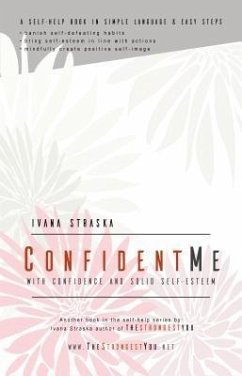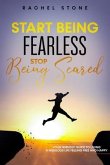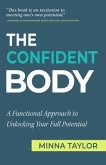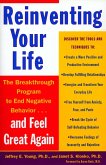This book helps people caught in the trap of low self-esteem and lacking confidence. It guides the reader to change negative thinking about self and enhance strengths and qualities. The reader learns to build confidence with restructuring of their thinking, assertiveness, mindfulness, compassion, visualization, and much more. Through thinking and writing, Straska guides the reader towards self-acceptance and acknowledging personal qualities. She provides comprehensive strategies to change the habits that erode self-esteem. The paperback provides space for the reader's writing and it includes QR codes to easily access additional free resources such as audio tracks, relaxation, meditation, visualization, diagrams and more. E-format of this book includes direct links to these resources.
The goals of the book:
Solid self-esteem is not tangible but is something that people need to smoothly move through life and do it with joy. Self-esteem is a core psychological asset allowing the utilization of skills and potential. It is a personal concept of values, feelings and actions. The good thing about self-esteem is that nobody is born with low or high esteem. Almost anyone can build a solid self-esteem.
Through life experience, people learn to think and feel someway about themselves. In self-reflection, they assess behaviour, feelings and compare them with their values. Self-esteem evolves from moment to moment by valuations and actions. The problems with self-esteem rise from what people validate and believe. Based on their beliefs, they compare themselves, and when they aren't the person they wish to be, their self-esteem goes down. To have a solid self-esteem, people have to assess personal actions in harmony with their values.
Whether someone has solid self-esteem depends on whether they live their values, whatever these values might be. When a self-esteem concept is built upon good values, people are able to grow good feelings towards themselves. Along with good values, mindfully developed self-esteem aids to remove underlined fears and conflicts. Solid self-esteem works as psychological immunity. It protects an individual's strengths and allows personal adequacy.
The goals of the book:
- Recognize personal values.
- Apply techniques enforcing personal strengths.
- Enforce positive feelings about self.
- Acknowledge self-destructive habits.
- Learn strategies to banish self-defeating habits.
- Bring self-esteem in line with actions.
- Develop confidence through positive attitude.
- Learn to think and feel positively about self.
- Bring mindfulness into self-esteem.
- Learn techniques to change thinking errors.
- Understand how acceptance and compassion improve self-esteem.
Solid self-esteem is not tangible but is something that people need to smoothly move through life and do it with joy. Self-esteem is a core psychological asset allowing the utilization of skills and potential. It is a personal concept of values, feelings and actions. The good thing about self-esteem is that nobody is born with low or high esteem. Almost anyone can build a solid self-esteem.
Through life experience, people learn to think and feel someway about themselves. In self-reflection, they assess behaviour, feelings and compare them with their values. Self-esteem evolves from moment to moment by valuations and actions. The problems with self-esteem rise from what people validate and believe. Based on their beliefs, they compare themselves, and when they aren't the person they wish to be, their self-esteem goes down. To have a solid self-esteem, people have to assess personal actions in harmony with their values.
Whether someone has solid self-esteem depends on whether they live their values, whatever these values might be. When a self-esteem concept is built upon good values, people are able to grow good feelings towards themselves. Along with good values, mindfully developed self-esteem aids to remove underlined fears and conflicts. Solid self-esteem works as psychological immunity. It protects an individual's strengths and allows personal adequacy.
Dieser Download kann aus rechtlichen Gründen nur mit Rechnungsadresse in A, D ausgeliefert werden.









